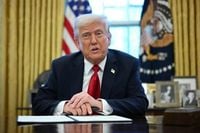Belgium’s economic landscape is facing a turbulent shift following the announcement of new U.S. import tariffs, a move that has raised alarms among the nation’s employers and political leaders alike. The tariffs, unveiled by President Donald Trump, impose a 10% minimum tax on most goods imported into the United States, with a more severe 20% rate specifically targeting the European Union. This decision is poised to impact Belgium adversely, both directly and indirectly, as it grapples with its position as a key trading partner of the U.S.
According to Olivier Joris, the director of European and International Affairs at the Federation of Belgian Enterprises, the ramifications of these tariffs will reverberate through Belgium’s economy. "This move will damage Belgium, Europe and the global economy," Joris stated, emphasizing the dual impact on Belgian companies. The U.S. ranks as Belgium’s fourth largest trading partner, following Germany, France, and the Netherlands. The imposition of these tariffs is particularly concerning given that Belgium exports a significant amount of semi-finished products to neighboring countries, which in turn supply finished goods to the U.S. market.
Joris elaborated on the potential fallout, noting that various sectors, including chemicals, machinery, cars, and food, would be affected. He remarked, "As a small export-oriented economy, the measures will hit us hard," indicating that the economic strain could be profound. While it is too early to quantify the exact financial impact, Joris believes that the negative effects are "inevitable." He warned that the situation represents a "lose-lose scenario," where European and Belgian products would lose competitiveness, potentially leading to inflation in the U.S. as well.
Flemish employers’ organization Voka echoed these sentiments, calling the tariffs a "sledgehammer blow" to Belgium’s economy. Managing director Hans Maertens expressed concern that the tariffs were more damaging than initially anticipated, estimating that the new measures could cost the Belgian economy up to 12 billion euros annually. "Our companies live off exports," Maertens stated, urging the government and the European Union to respond with proportionate and targeted countermeasures rather than escalating into a global trade war.
Adding to the concerns, Member of the European Parliament Kathleen Van Brempt, representing the Flemish socialists Vooruit, criticized Trump’s tariff policy for exacerbating inflation and harming businesses. She stated, "He is pushing prices up and purchasing power and competitiveness down. We are all going to feel the effects." Van Brempt cautioned against retaliatory tariffs, arguing that such actions would lead to further escalation and ultimately harm both sides.
Belgium’s Foreign Affairs Minister, Maxime Prévot of Les Engagés, also weighed in on the situation. He called for increased economic cooperation between the U.S. and Europe, emphasizing that both economies are closely linked. Prévot remarked, "No one wins in a trade war. Instead of building new barriers, we must build bridges." His statement reflects a broader sentiment among Belgian leaders who recognize the importance of maintaining strong transatlantic relations during these challenging times.
The timing of these tariffs is particularly troubling, as Belgium faces the dual challenge of managing economic growth while the U.S. demands that its NATO partners increase defense spending. Prévot noted that the tariffs would not only impact businesses but also the everyday lives of Belgian citizens, reducing economic growth at a time when increased defense spending is being called for. "It will, one way or another, hit not only Belgian companies but also our citizens, partly due to lesser economic growth," he stated.
As the situation unfolds, Belgian officials are advocating for swift negotiations with the U.S. to mitigate the impact of the tariffs. The Federation of Belgian Enterprises is urging the government to engage in dialogue with American counterparts to find a way forward that avoids a full-blown trade war. The stakes are high, and the potential for economic disruption looms large.
In conclusion, the newly announced U.S. tariffs represent a significant challenge for Belgium, a nation that heavily relies on exports. With political leaders and business associations alike sounding the alarm, the focus now shifts to how Belgium will navigate these turbulent waters while striving to maintain its economic stability and international partnerships.






